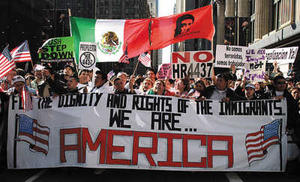ImmigrationUndocumented construction workers in NYC will benefit from Obama’s executive action
Undocumented workers in the U.S. construction industry have much to gain from President Barack Obama’s Deferred Action for Parental Accountability (DAPA) initiative, which allows some immigrants to apply for work permits while deferring deportation attempts. New York City’s booming construction market has attracted thousands of undocumented workers who are willing to work for low wages, but it has also encouraged many property developers to ignore safety hazards around construction sites.

Workers demonstrate for immigrant rights // Source: people.com.cn
Undocumented workers in the U.S. construction industry have much to gain from President Barack Obama’s Deferred Action for Parental Accountability (DAPA) initiative, which allows some immigrants to apply for work permits while deferring deportation attempts. New York City’s booming construction market has attracted thousands of undocumented workers who are willing to work for low wages, but it has also encouraged many property developers to ignore safety hazards around construction sites. Employers who hire the cheapest labor available often try to reduce costs by ignoring safety training and equipment, said Charlene Obernauer, director of the advocacy group New York Center for Occupational Safety and Health (NYCOSH). The result is a growing number of work related injuries among workers who are reluctant to report employers to city and building officials or even demand better working conditions from their employers, because they fear losing their job or deportation.
DAPA will help eliminate the threat of deportation for many undocumented workers, thereby allowing them to fight for work environments that meet safety standards. “The plan will make a world of difference for undocumented construction workers,” Said Haeyoung Yoon, deputy program director of the advocacy group National Employment Law Project. “Undocumented workers live in a culture of fear because unscrupulous employers often use immigration status to retaliate against workers who want to assert their rights,” she added. “The fact that they can work legally takes away that huge fear.”
Once the fear of deportation is no longer a deterrent to reporting workplace injuries, undocumented construction workers must then work with their employers and city officials to ensure safer work environments. New York State requires all construction workers to complete a ten-hour safety training by the Occupational Safety and Health Administration (OSHA), but enforcement is lacking. The New Republic notes that OSHA is notoriously understaffed, leaving many construction sites without proper inspections. Labor activists report that a black market for fake OSHA-10 training certificates is flourishing throughout New York City. To make matters worse, 72 percent of construction-site deaths in the city in 2011 and 2012 occurred on sites where employees had not participated in state-approved safety training. To help improve working conditions, nonprofit organizations like Brooklyn-based Worker’s Justice Project offer OSHA-10 classes, perform safety audits of construction sites, and negotiate with employers to ensure fair wages for workers.
Some labor activists and businesses hope that DAPA will help create a pathway for undocumented workers to not only organize for safer work environments and better pay, but to also contribute to the American economy. “Immigration reform is good for the American people because my employees pay taxes, social security, and my company pays workers’ compensation,” said Darlene East, President of Holes Inc., a concrete sawing, drilling, demolition, and removal firm in Houston. “There are many people out there who have run to the underground economy and are not paying that. For fairness, everyone should be paying their fair share of employment taxes. We need to know who they are and get them on the books and have them pay the same taxes that my employees have to pay.”
